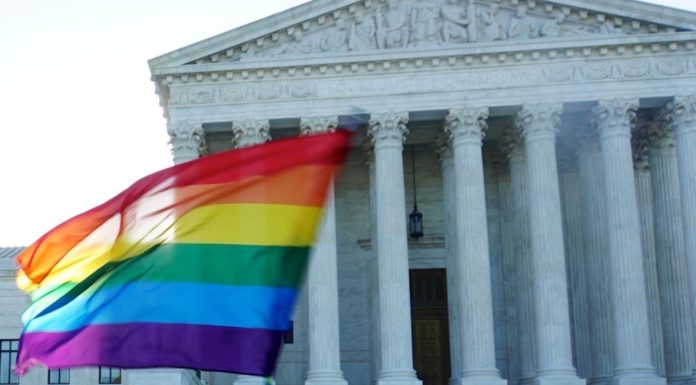[This column is an updated version of that which appears in the July/August 2022 issue of Boston Spirit magazine. Subscribe for free today.]
On June 24, a majority of Justices of the US Supreme Court overturned a half-century-old precedent protecting access to abortion throughout the country. The decision will have devastating consequences for millions of women and for anyone who can become pregnant, including members of the LGBTQ+ community who need access to abortion care. The consequences of restricting or completely banning abortion, as some states are poised to do, will fall hardest on people and families of color and those without the financial resources to travel out of state or seek alternative routes to care.
The movements for LGBTQ+ and reproductive justice are fundamentally connected, and GLAD is working with our partners in the reproductive equity movement to fight for access to abortion for all who need it. Here in Massachusetts, we are supporting a measure recently passed in the House that, if signed into law this session, will provide and strengthen important protections for access to both abortion care and essential health care for transgender people.
The Dobbs opinion and a concurrence by Justice Thomas also suggest the current majority on this Court may be willing to further limit longstanding constitutional protections for vital individual rights. In doing so, as the dissenting Justices warned, the Court is opening the door for a return to dangerous government intrusion into our most personal decisions and freedoms. This is a moment when every one of us needs to be engaged on every level to protect our liberties.
In his concurrence, Justice Thomas specifically expressed his belief — not for the first time — that key decisions impacting LGBTQ people’s relationships, family-building and the freedom to marry — Lawrence (affirming the right to consensual same-gender intimacy) and Obergefell (affirming the freedom to marry) — should be reconsidered.
While Lawrence and Obergefell remain the law of the land — and GLAD will defend those decisions against any challenges as both good for our country and rightly decided — the Dobbs decision raises concerns for LGBTQ people and families, particularly at a moment where LGBTQ people are already facing staggering legislative attacks around the country. GLAD worked with COLAGE, Family Equality and NCLR to publish an FAQ to provide information on steps LGBTQ people can take now to protect their spousal and parenting relationships. We also encourage anyone to contact us at www.GLADAnswers.org with specific questions.
Amidst concerns that the Supreme Court is pulling back protections, one area where we have both unfinished business and an important opportunity in Massachusetts is securing family equality with the Massachusetts Parentage Act.
Protecting our children and families, however formed, has been a pillar of GLAD’s LGBTQ justice work for over four decades, alongside nondiscrimination protections, transgender rights, protections for people living with HIV, and support for LGBTQ youth.
Despite progress — including winning the freedom to marry — there is still work to do to fully secure our LGBTQ families. In recent months we’ve seen a trial court in Maine strip a child of her LGBTQ married mother because of a lack of biological relationship. We’ve seen the Idaho Supreme Court refuse to recognize an LGBTQ married parent as a parent because she had no biological relationship with her child. And laws like Florida’s Don’t Say Gay or Trans law not only target LGBTQ youth, they restrict even the discussion of our families in schools. Attacks on LGBTQ families are only increasing nationwide.
And, the fact is that 18 years after same-gender couples became able to legally marry in Massachusetts, Massachusetts family laws have not been updated to protect the children of LGBTQ families so that LGBTQ families — right now — face many harms. Without clear inclusion in our state parentage laws, parents and children face separation by the child welfare system. De facto parents have no access to legal parentage, leaving them unable to provide health care to their children or to make decisions for their children. There are no protections for children born through surrogacy, meaning some children wait years to establish their parentage. Parents — married and unmarried — still have to undergo the expensive, time-intensive and disrespectful process of adopting their own children in order to fully secure their families. The current state of family law in the Commonwealth renders LGBTQ families and their children second-class.
With less than a month remaining in the current Massachusetts legislative session, it is our hope that the legislature will finally pass the Massachusetts Parentage Act. Based on the Uniform Parentage Act (UPA) 2017, a best-practice framework for ensuring the protection of the legal relationship between parents and children, the MPA would update state law to clarify who can be a parent and how to establish parentage. It would add important protections for children born through assisted reproduction and surrogacy. The MPA would also enable LGBTQ+ parents to establish parentage the same way other families do, including through a voluntary acknowledgment of parentage, and provide a clear standard for courts to resolve competing claims of parentage.
Every other New England state has taken steps to update their parentage laws, as have many other states including most recently Colorado in May 2022. It’s critical that we make these changes to protect children in every state.
GLAD and our partners in the MA Parentage Act Coalition kicked off Pride month in June with a rally for the MPA at the State House. J. Shia shared the heartbreaking story of how her son Audai was placed in foster care because the state refused to recognize her parental status, despite the fact that she has raised Audai since birth. While obtaining legal guardianship enabled her son to return to her care, their family relationship is still questioned. “Every day I carry a notarized copy of my son’s guardianship form in my wallet. I need to present this for schools, his doctors’ and dentist appointments,” Shia said. “I’m constantly being questioned. For someone who’s been Audai’s primary parent since the day he was born, this situation is wildly degrading. I am his parent, not just his guardian.”
You can read more of J. Shia and Audai’s story, and learn more about the Massachusetts Parentage Act at massparentage.com.
Also this session, GLAD is supporting an important bill to expand access to PrEP — a safe, simple medication that is nearly 100 percent effective in preventing HIV transmission yet remains underutilized. The bill allows pharmacists to dispense an initial supply of PrEP without a prescription, while connecting customers to a health care provider for ongoing needs. The Senate passed the measure at the end of June, and we are hopeful the House will follow suit.
See glad.org for more information on this and on other important measures to advance justice for our communities, including bills to allow for more accurate identification on state documents including birth certificates, to decriminalize consensual sex work and to reduce the brutal harm LGBTQ people experience when incarcerated.
We hope that by the time the session wraps up at the end of July, our legislators will once again lead on protecting individual rights, advance these measures along with the MA Parentage Act and increase protections for LGBTQ people and people living with HIV in the Commonwealth.
More: glad.org
Not a subscriber? Sign up today for a free subscription to Boston Spirit magazine, New England’s premier LGBT magazine. We will send you a copy of Boston Spirit 6 times per year and we never sell/rent our subscriber information. Click HERE to sign up!









